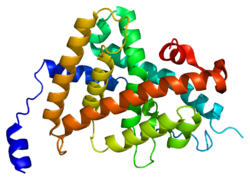Thyroid hormone receptor alpha (TR-alpha) also known as nuclear receptor subfamily 1, group A, member 1 (NR1A1), is a nuclear receptor protein that in humans is encoded by the THRA gene.[5][6][7]
- ^ a b c GRCh38: Ensembl release 89: ENSG00000126351 – Ensembl, May 2017
- ^ a b c GRCm38: Ensembl release 89: ENSMUSG00000058756 – Ensembl, May 2017
- ^ "Human PubMed Reference:". National Center for Biotechnology Information, U.S. National Library of Medicine.
- ^ "Mouse PubMed Reference:". National Center for Biotechnology Information, U.S. National Library of Medicine.
- ^ "Entrez Gene: THRA thyroid hormone receptor, alpha (erythroblastic leukemia viral (v-erb-a) oncogene homolog, avian)".
- ^ Spurr NK, Solomon E, Jansson M, Sheer D, Goodfellow PN, Bodmer WF, Vennstrom B (Jan 1984). "Chromosomal localisation of the human homologues to the oncogenes erbA and B". The EMBO Journal. 3 (1): 159–63. doi:10.1002/j.1460-2075.1984.tb01777.x. PMC 557313. PMID 6323162.
- ^ Dayton AI, Selden JR, Laws G, Dorney DJ, Finan J, Tripputi P, Emanuel BS, Rovera G, Nowell PC, Croce CM (Jul 1984). "A human c-erbA oncogene homologue is closely proximal to the chromosome 17 breakpoint in acute promyelocytic leukemia". Proceedings of the National Academy of Sciences of the United States of America. 81 (14): 4495–9. Bibcode:1984PNAS...81.4495D. doi:10.1073/pnas.81.14.4495. PMC 345617. PMID 6589608.






